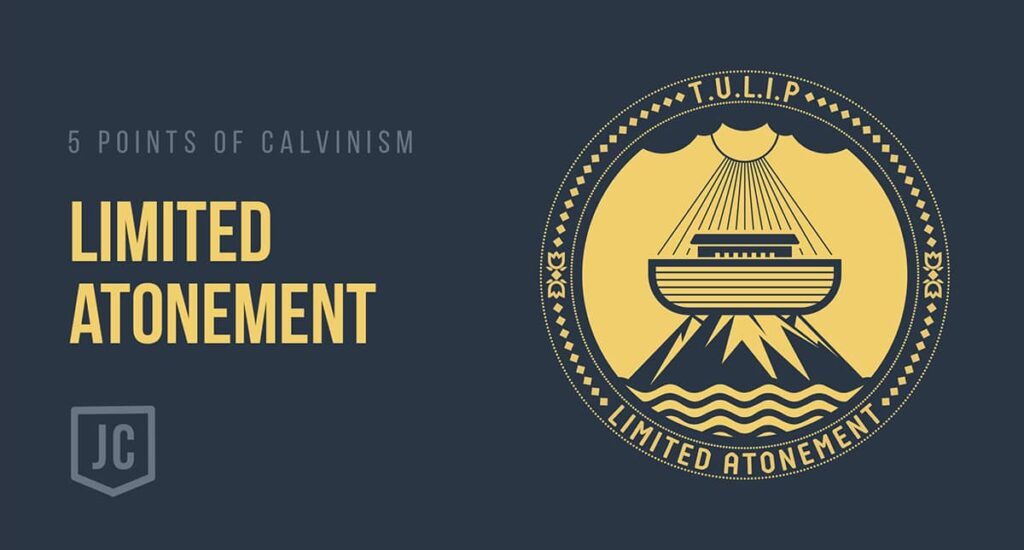The Most Controversial of the Five Points of Calvinism
Limited atonement is often considered the most controversial point of the Five Points of Calvinism. This is because, like Unconditional Election, it is often deemed unfair for God to save some and not others. Nevertheless, despite its controversy, limited atonement has been essential in the Reformed understanding of salvation from Calvin to today.

Here’s the thing, while controversial, every Christian, by logical necessity, believes in some limitation on the atonement. Either you believe, as the Reformed do, that the atonement is limited in scope, i.e., it’s 100% effective for only God’s elect. Or you believe that the atonement is limited in efficacy, i.e., it is offered to 100% of the population, but it may or may not be effective in saving anyone.
What is Limited Atonement?
By atonement, we are referring to the death of Jesus Christ on the cross for the payment of sins. By limited, we mean that payment is only made for God’s chosen people. Limited atonement, then, flows directly from unconditional election. If God unconditionally elected some people for salvation, it stands to reason that Christ atoning sacrifice on the cross was effective for those chosen people alone (John 10:11). As the Westminster Confession states, “Neither are any other redeemed by Christ, … but the elect only” (WCF 3.6).
While the Reformers held that Christ’s sacrifice was effective for the elect, this does not imply the atonement of Jesus Christ was not powerful enough to cover the sins of all people. However, Jesus did not come just to make salvation “possible” for all people, He came to ensure that all His people would be saved. This is why some theologians prefer to call the teaching “definite atonement” or “particular redemption” as Christ made a definite, successful redemption for a particular people.
What About the Bible Verses That Seem to Refute This Point of the Five Points of Calvinism?
At this point, you might be thinking, “Wait! Doesn’t the Bible say that God so loved the world, He sent His Son to save it?”
Some Bible passages do seem to support the idea of “universal” atonement, such as 1 John 2:2, John 3:16, and John 6:51, which use the words “all” and “world.” However, it’s important to understand that in Scripture these words do not always mean every single individual in the world. For example, in John 17:9, Jesus prays for his chosen people and not for the “world” of reprobate wicked. In Romans 5:18, “all men” who receive justification does not include every man on earth but rather every member of the body of Christ. Similarly, 1 John 2:2 says Christ is the propitiation for the sins of the apostle and those addressed, but also for the sins of the whole world—all those given to Him by the Father throughout history.
Again, the Westminster Confession says, “The Lord Jesus by His perfect obedience and sacrifice of Himself which He through the eternal spirit once offered up unto God, hath fully satisfied the justice of His Father and purchased not only reconciliation but an everlasting inheritance in the Kingdom of Heaven for all those whom the Father hath given unto Him.” (Emphasis added, WCF 8.5).
How Does Limited Atonement Fit in With God’s Plan for Salvation?
The doctrine of limited atonement is a beautiful and profound expression of God’s victory over sin and death. It teaches us that God’s plan of salvation was not left to chance or human decision but was carried out perfectly through the work of the Trinity.
It reminds us that the Father, Son, and Holy Spirit are completely unified in accomplishing God’s purpose of saving His people. The Father elects those who will be saved, the Son pays their debt on the cross, and the Holy Spirit regenerates and produces fruit in them. The unity of the Trinity is essential to limited atonement, as a universal atonement would contradict the unity of the Trinity, implying that Jesus failed to accomplish what He came to do.
It gives glory to God alone and points us to the sovereignty of God in salvation. It teaches that the cross will save all for whom it was intended, and the Lamb of God, Jesus, will receive the reward for His suffering. The doctrine of limited atonement should be a comfort to those who have been saved by God’s grace, knowing that they were chosen by the Father, redeemed by the Son, and sanctified by the Holy Spirit.
What Does This Mean for You?
While Reformed theology does not affirm a universal atonement, it is universally acknowledged that the gospel is preached and offered to all people who hear it. However, only the elect will accept it, and this is not something that we can control or manipulate.
This is good news. Our hope and assurance come not from our ability to believe or to do good works but from the finished work of Christ on the cross. If we trust in His atonement and cling to Him, we have nothing to fear. Our salvation is secure in Him, and nothing can snatch us out of His hand. Let us, therefore, preach the gospel to all and trust in the sovereignty of God to bring His elect to Himself.